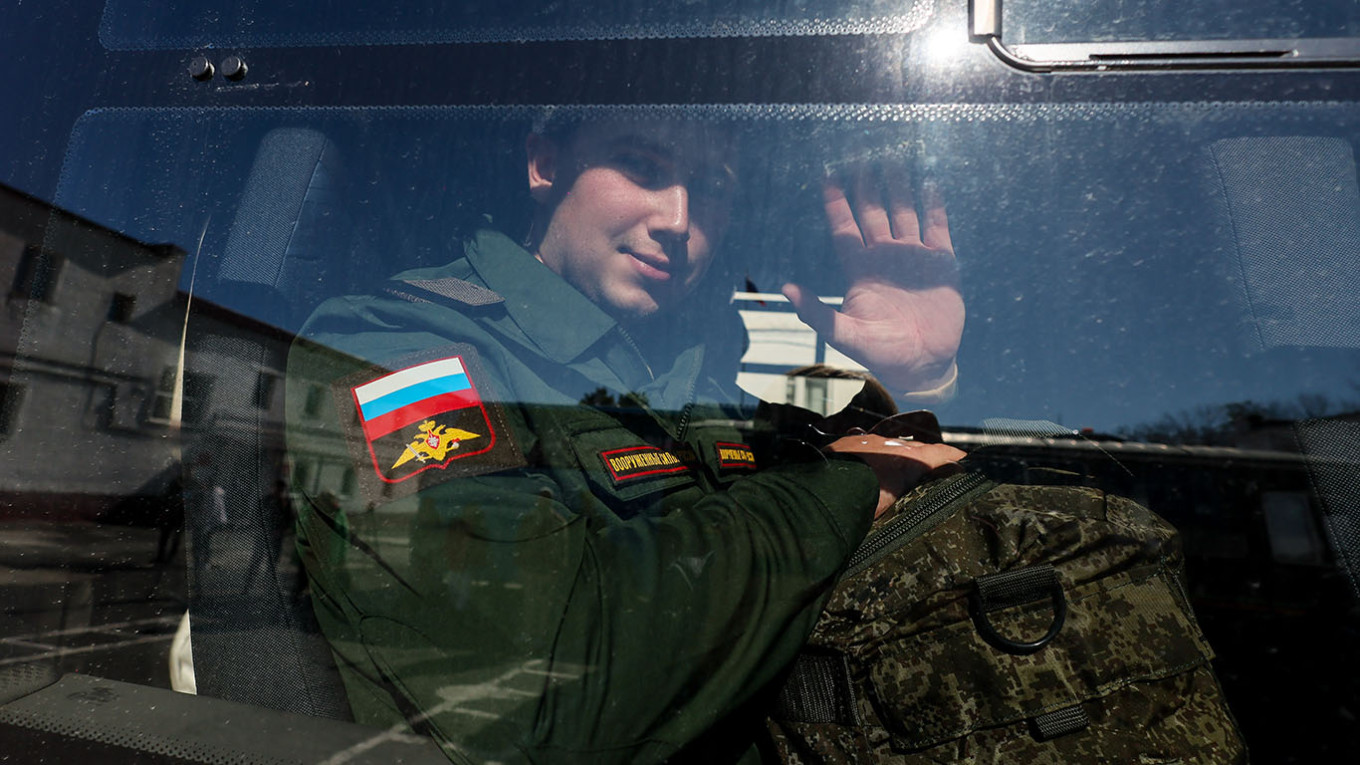When Vitaly Vasilyev, a 23-year-old from a rural village in Chuvashia, was conscripted into the Russian army in 2021, he never intended to become a contract soldier or engage in combat.
However, like many other Russian conscripts, he found himself stationed on the front lines in Ukraine.
“I never agreed to a contract, even though the officers were pushing us to do so from the start,” Vasilyev recounted in an interview with The Moscow Times from his hiding place in Yerevan, Armenia. “I was in tears. I submitted reports stating my refusal to serve, but it changed nothing.”
According to leaked data released in May by the exiled media outlet IStories, over 50,000 Russian soldiers have fled the military since the large-scale invasion of Ukraine began in February 2022.
Among these deserters are a significant number of conscripts: predominantly young men from impoverished, remote areas, who claim they were coerced into signing contracts against their will before being sent to the front lines.
Despite denials from President Vladimir Putin and other high-ranking officials, conscripts have been involved in combat from the early stages of the invasion. At least 100 conscripts were reported killed, captured, or unaccounted for during Ukraine’s incursion into the Kursk region in August 2024.
The stories shared by conscripts for this article have been validated by InTransit and Idite Lesom, organizations that assist those fleeing the conflict.
In January 2022, Vasilyev was reassigned to Unit 02511 in a village near St. Petersburg, where his military identification was taken away.
When it was returned after he was moved to the Kursk region, it had been modified to reflect that he was a contract soldier.
“An officer pulled me aside and warned, ‘You didn’t hear this from me, but a war is about to start,’” Vasilyev recalled. “At the time, I couldn’t take it seriously.”
On February 24 at 3:00 a.m., he and his fellow soldiers were gathered and told they would be defending their homeland. They were given painkillers, grenades, pistols, and uniforms, then loaded onto tanks and trucks bound for combat.
“Some were smiling and laughing as if they didn’t grasp the gravity of the situation,” he noted. “Later, I would find out that one conscript shot himself in a trench just days later because he could no longer cope.”
Initially, Vasilyev resisted participating in the invasion; however, he was forcibly sent to Kramatorsk in eastern Ukraine in March 2022.
“The headquarters was in a school, and we were stationed in a nearby private house,” he explained. “The family that owned the house fled in haste, leaving everything behind, including photos and documents. The atmosphere was terrifying. Our commanders repeatedly returned with an armored vehicle full of alcohol, which they consumed on the second floor while we stood guard.”
According to Vasilyev, Russian troops would capture local men and imprison them in a basement beneath a grocery store for undisclosed reasons.
“There was widespread looting. One house had a sign saying, ‘A child lives here.’ The soldiers broke in anyway. They stopped only after discovering the mother and child hiding in the basement,” he recounted.
After spending a week in Kramatorsk, Vasilyev shot himself in the foot with his own weapon.
“We were assigned sentry duty. This wasn’t my war, and I prayed I wouldn’t have to kill anyone. I devised a plan: I loaded my rifle with 31 bullets to make it look accidental,” he shared. “It was my first time using a firearm, and that shot saved my life.”
Rather than being released, he faced interrogation by his superiors, who accused him of self-harm to evade service—a violation under military law in Russia.
Transferred from a field hospital near Izium, Ukraine, to a hospital in Moscow, he received assistance from a sympathetic doctor in obtaining documents for a medical discharge.
“There were others like me. One guy shot his hand, claiming it was an accident too,” he said.
While in Moscow, Vasilyev was also questioned by agents from the Federal Security Service (FSB).
“I fabricated a story: I said someone accidentally shot me while jumping from an armored vehicle. The FSB officer was less concerned about my self-inflicted injury. He wanted to know who I met, who I spoke to, and if I had killed anyone,” he remembered.
Eventually, he was discharged and permitted to return to his home village.
“For two years, I hardly left my house,” he shared. “I was terrified of the police. I ordered food deliveries. It felt like I was under another pandemic lockdown.”
Then, in November 2024, military police came looking for him after obtaining his contact information from his parents, ordering him to report back to his unit the following day.
“I knew exactly what to do. I had been in contact with the Idite Lesom [‘Get Lost’] crisis group. That night, I escaped to Belarus and then flew to Yerevan,” he said.
At Minsk airport, a border guard questioned him about his military status and made a call. To his surprise, he was permitted to board the flight.
Now settled in Armenia, he remains anxious about being sent back to Russia. His younger brother, drafted in 2024, is still deployed at the front.
Vasilyev’s experience highlights how Russia has institutionalized the use of conscripts in its military actions in Ukraine. Many are coerced into signing contracts or deployed without any formal agreement. In April 2023, the State Duma passed legislation allowing conscripts to sign contracts from their first day of service.
For Nikita Zvezdov, a 19-year-old conscripted in June 2024 after being expelled from technical college, the choices he faced were equally stark.
“The command was organizing conscripts into units. Every six months, trucks were sent to transport them to the front. Some were led to believe they would receive payment, but in reality, they only ended up with 2,000 rubles [$24] a month,” he told The Moscow Times.
Those who resisted faced severe repercussions, Zvezdov claimed. He recounted instances of soldiers being locked in boot dryers set to extreme temperatures and beaten until they complied.
“I endured torture at the Sergeyevka training ground — forced to complete 200 pushups and squats in a gas mask and hazmat suit. I had to run 50 laps in full gear while being taunted the entire time. I genuinely thought I would die,” he described.
He mentioned a commander who routinely shot conscripts with rubber bullets. Many soldiers suffered heart attacks or mental breakdowns, with at least one reported suicide.
Under immense pressure, Zvezdov ultimately signed a contract in September 2024. By October, he found himself at the Bikinsky training range, digging waste pits and burning trash in the sweltering heat while waiting for deployment orders to Mariupol or Melitopol.
“The commander changed our deployment plans daily: Mariupol, Melitopol; November, then December,” he explained. “Finally, he informed us we only had two weeks left. I contemplated stepping on a landmine or injuring myself. I realized I might never return home alive.”
After persuading his officers to grant him short leave to “say goodbye to relatives,” he made the decision to leave the country.
“At first, I considered hiding or even surrendering and accepting a prison sentence. But then I realized it was better to seek some form of life abroad if my own country wasn’t willing to let me live,” he said.
Both Vasilyev and Zvezdov ended up in Armenia, one of the few countries where Russians can enter without an international passport. Nevertheless, even in Armenia, their safety remains precarious.
Deserters express a constant fear of being captured by Russian forces based in Gyumri. Surveillance of deserters is not uncommon, and at least two abductions have been reported.
Zvezdov recounted a moment when he sold a laptop online, only to discover that the buyers were Russian soldiers from the base in Gyumri.
“I felt anxious that they could be after me, so I tried to mask my fear,” he said. “But they simply purchased the laptop and left.”
Given the Russian military presence in Armenia, many deserters feel their only hope is to reach Europe and seek asylum. In July, Armenian police stopped Russian military officials from capturing a soldier who had fled there.
Despite the uncertain paths ahead, both Vasilyev and Zvezdov expressed gratitude for having survived.
“It’s hard to feel good about how my life has turned out, with so much wasted time. But I’m relieved that I didn’t end up on the front lines. I’m already quite anxious, and I have no idea how I would manage with PTSD,” Zvezdov stated.

